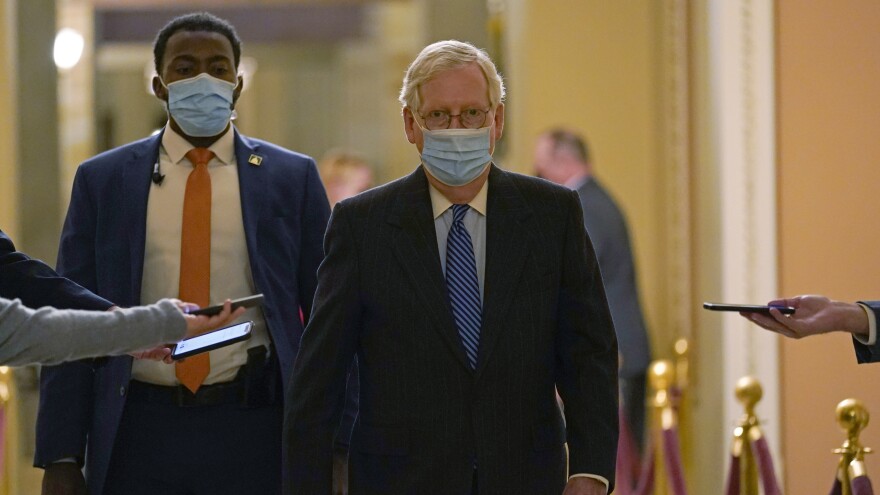Updated at 5:59 p.m. ET
Senate Majority Leader Mitch McConnell, R-Ky., says a measure that would increase direct payments to many Americans has "no realistic path to quickly pass the Senate."
McConnell is moving ahead with a plan to avoid a public rift within the GOP over stimulus payments demanded by President Trump ahead of a critical runoff election in Georgia.
Instead of putting the $2,000 relief payments for an up-or-down vote on their own, McConnell tied the checks to Trump's demands to investigate alleged voter fraud and to repeal a decades-old law that would open the door for lawsuits against social media companies for the content they choose to leave up or take down.
McConnell push back against Democrats' criticism in floor remarks Wednesday.
"The Senate is not going to split apart the three issues that President Trump linked together just because Democrats are afraid to address two of them," he said.
"The Senate is not going to be bullied into rushing out more borrowed money into the hands of the Democrats' rich friends who don't need the help. We just approved almost $1 trillion in aid a few days ago. It struck a balance between broad support for all kinds of households and a lot more targeted relief for those who need help most."
Senate Minority Leader Chuck Schumer, D-N.Y., told reporters in the Capitol earlier in the day that the move was an attempt "to kill the checks — the $2,000 checks desperately needed by so many American families — by tying them completely to partisan provisions that have absolutely nothing to do with helping struggling families across the country."
The chaotic scramble comes as McConnell attempts to shield GOP members from difficult votes in the days before control of the Senate is determined in Georgia. McConnell attempted to explain his plan on Tuesday by saying Trump tied the issues together, so the Senate will, too.
Complicating matters further, the checks are also politically entwined with a must-pass veto override on a massive defense bill. Trump vetoed the hugely bipartisan bill over his demand to repeal the liability protections that benefit social media companies.
Sen. Bernie Sanders, I-Vt., has suggested he will filibuster that measure until the Senate votes on the $2,000 payments.
"Two-thirds of the House voted to provide those $2,000 checks," Sanders told reporters in the Capitol. "The overwhelming majority of Americans want that, Trump wants it, Biden wants it, Pelosi wants it, Schumer wants it. Let's have a vote, and let's pass this damn thing."
Sanders has little ability to stop the eventual vote on the veto override.
The Senate left Wednesday without a final vote on either measure and reconvenes at noon on Thursday.
The complicated process comes as a growing number of Republicans have come out in favor of the checks, including Georgia Sens. Kelly Loeffler and David Perdue who are both facing Jan. 5 runoff elections. The outcome of the Georgia races will determine control of the Senate.
Perdue and Loeffler both embraced the $2,000 payments after Trump threatened to block a massive government spending and coronavirus relief bill that included smaller $600 checks for eligible Americans.
The two have campaigned as Trump allies and have benefited from the president's support. But expanded stimulus checks are not widely popular among Republicans, in part because the payments could cost around $464 billion, according to a nonpartisan congressional budget estimate.
Copyright 2020 NPR. To see more, visit https://www.npr.org. 9(MDAyNDY5ODMwMDEyMjg3NjMzMTE1ZjE2MA001))










